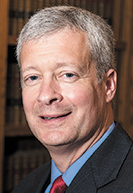Subscriber Benefit
As a subscriber you can listen to articles at work, in the car, or while you work out. Subscribe NowThe cities of Green Bay, Kenosha and Racine are asking a federal judge to make former President Donald Trump pay more than $42,000 in legal fees in a case filed by an Indianapolis law firm challenging Wisconsin’s presidential election results. The request is in addition to more than $145,000 in fees sought by the state’s governor.

The additional request for legal fees as a sanction was reported by the Wisconsin State Journal on Monday and concerns the same lawsuit filed by a Kroger Gardis & Regas team led by partner William Bock III. The petition for fees comes days after Democratic Wisconsin Gov. Tony Evers moved for attorney fees for what the governor’s office alleged was bad-faith litigation.
Bock previously called Evers’ earlier petition for fees “baseless and totally without merit. We will respond further in due course.”
Trump lost to President Joe Biden by nearly 21,000 votes in Wisconsin, but his lawsuit filed by Kroger Gardis & Regas weeks after the election sought to have the Republican-controlled Legislature decide how to award the state’s 10 electoral votes instead of voters, arguing that long-standing voting practices in Wisconsin were improper.
U.S. District Judge Brett Ludwig said letting state lawmakers decide the outcome of the election would have resulted in “probably the most remarkable ruling in the history of this court or the federal judiciary.” Ludwig, a Trump appointee, ruled against him in December.
The U.S. Supreme Court refused to hear the case in March.
“The objective bad faith of plaintiff’s counsel in filing and litigating this action is evidenced by the scope of the relief sought and their relentless pursuit of it all the way to the United States Supreme Court, well after the election results in Wisconsin had been determined and certified,” wrote Daniel Lenz, attorney for the cities. “In essence, plaintiff’s counsel sought to disenfranchise every Wisconsin voter.”
The case in the Eastern District of Wisconsin is Trump v. Wisconsin Election Commission, et al., 2:20-cv-1785.
Please enable JavaScript to view this content.
